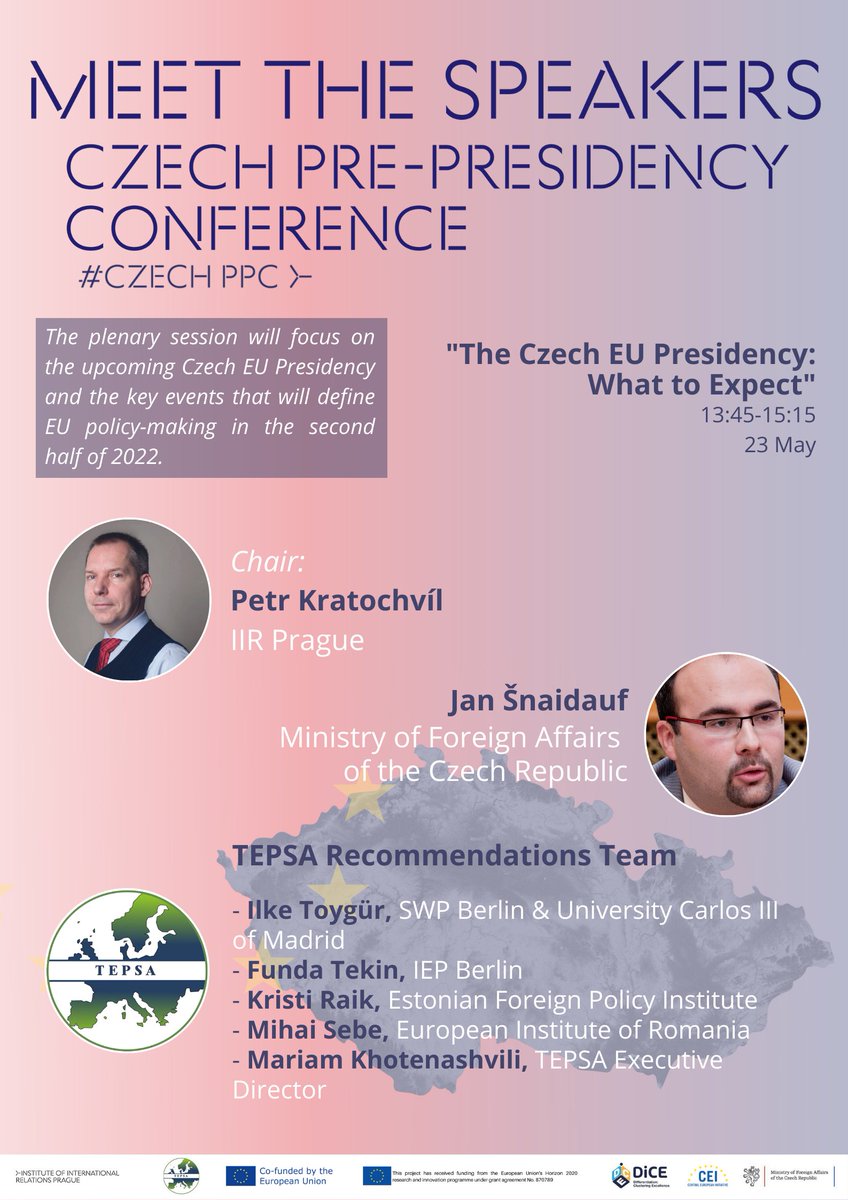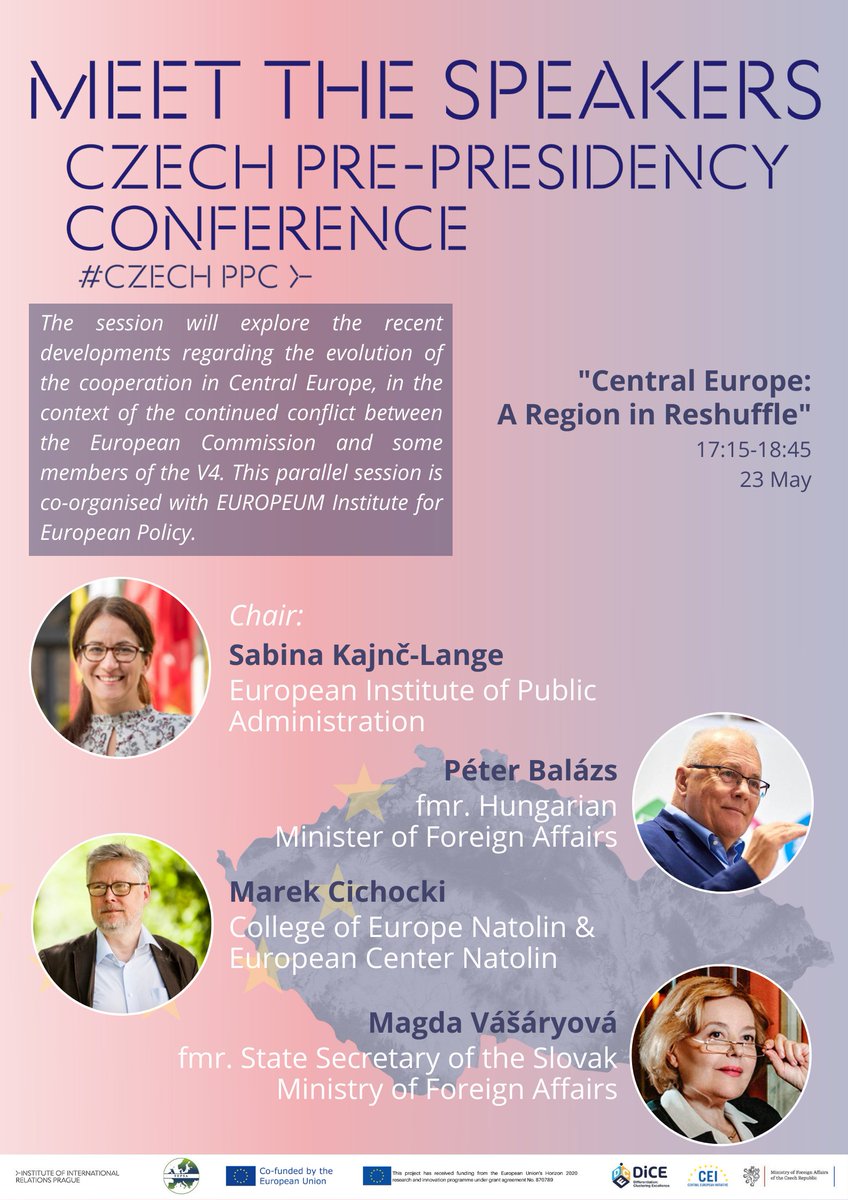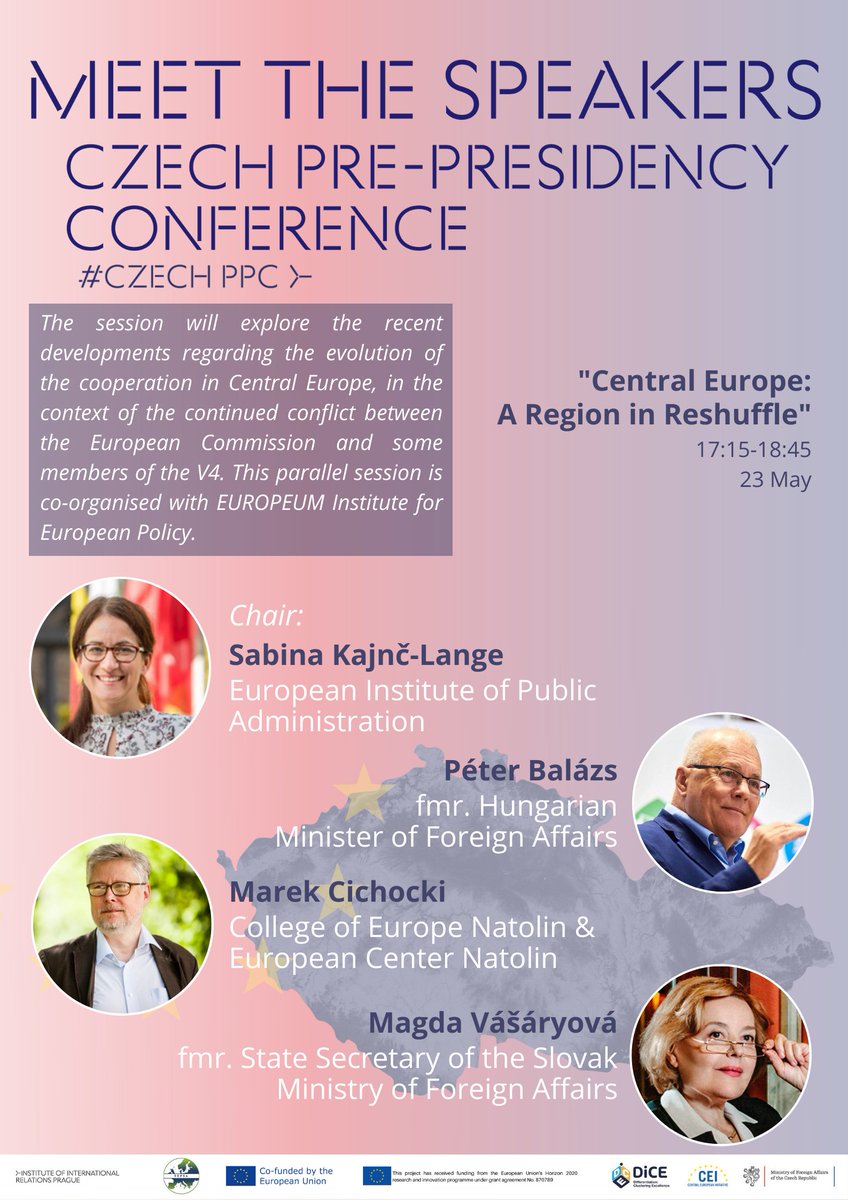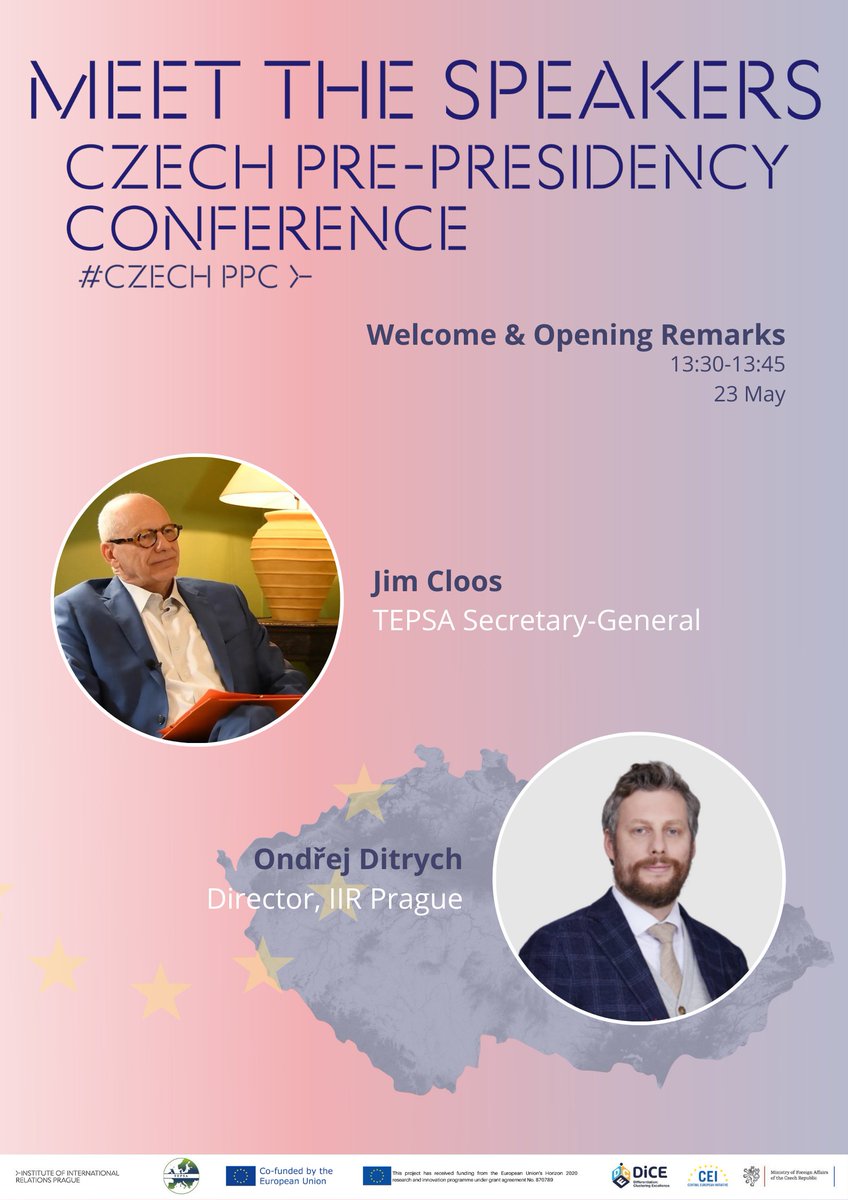
The #CzechPPC is starting NOW! As always, we'll be highlighting the best bits here on our Twitter account 💪🇨🇿
@IIR_Prague @dice_h2020 @EUROPEUMPrague @CEI_Secretariat @CzechMFA
/THREAD🧵
@IIR_Prague @dice_h2020 @EUROPEUMPrague @CEI_Secretariat @CzechMFA
/THREAD🧵

"We are part of the same family. We are diverse, but we are part of the same family, and we have a shared European history"
- @CloosJim, TEPSA Secretary-General in his remarks to open the #CzechPPC
/3
- @CloosJim, TEPSA Secretary-General in his remarks to open the #CzechPPC
/3
"The Pre-Presidency Conferences are important moments: we preview the next six months of EU policy. We find ourselves in the midst of a war in Ukraine, and we must approach the Czech Presidency with this front of mind"
- @CloosJim, TEPSA Secretary-General
/4
- @CloosJim, TEPSA Secretary-General
/4
"For each PPC, TEPSA presents recommendations to the incoming Presidency, and this time is no different - you will hear about the recommendations from their authors in the first panel"
- @CloosJim, TEPSA Secretary-General
/5
- @CloosJim, TEPSA Secretary-General
/5
If you want a preview of that panel about the TEPSA Recommendations to the Czech Presidency of the @EUCouncil, you can read them on our website now!
➡️ tepsa.eu/recommendation…
/6
➡️ tepsa.eu/recommendation…
/6
"The war in #Ukraine concerns enlargement, institutional reform, energy dependency, and more. It is a cliché to talk about "political crisis" all the time, but what we face now IS a true crisis"
- @oditrych, Director of @IIR_Prague opening the #CzechPPC
/7
- @oditrych, Director of @IIR_Prague opening the #CzechPPC
/7
"We seek to inform the vision of a Presidency which takes place in such a unique context: we know the basic priorities (Ukraine, energy, rule of law, and more), but we must also be ready to react to new developments"
- @oditrych, Director of @IIR_Prague
/8
- @oditrych, Director of @IIR_Prague
/8
"I wish you all productive discussions, and I look forward to them and their conclusions"
- @oditrych, Director of @IIR_Prague, opening the #CzechPPC
/9
- @oditrych, Director of @IIR_Prague, opening the #CzechPPC
/9
We now move on to the first plenary session of the #CzechPPC: "The Czech Presidency: What to Expect", in which TEPSA will present its recommendations to the Jan Šnaidauf (@CzechMFA)
/10
/10

"The Pre-Presidency Conferences are a tradition, and I am honoured to be invited to give an introductory speech. On behalf of the Czech presideency I would like to thank TEPSA for the Recommendations"
- Jan Šnaidauf (@CzechMFA)
/11
- Jan Šnaidauf (@CzechMFA)
/11
"The TEPSA Recommendations resonate very well with the plans of the Czech Presidency"
- Jan Šnaidauf (@CzechMFA)
/12
- Jan Šnaidauf (@CzechMFA)
/12
"To give you a sense of the topics we want to address within the external relations domain: What the #WarinUkraine means for Europe will be in the center stage. The humanitarian side, reconstruction, a clear European perspective for Ukraine"
- Jan Šnaidauf (@CzechMFA)
/13
- Jan Šnaidauf (@CzechMFA)
/13
"The Western Balkans is a region close to the usual Czech foreign relations file, and we will honour this during the Presidency: we will try to overcome hurdles to the accession process"
- Jan Šnaidauf (@CzechMFA)
/14
- Jan Šnaidauf (@CzechMFA)
/14
"We want to see a strong, resilient, and sustainable Europe: we have concrete issues in mind. Not least, strengthening the transatlantic cooperation with the US and NATO, energy security, and the geopolitics of emerging technologies"
- Jan Šnaidauf (@CzechMFA)
/15
- Jan Šnaidauf (@CzechMFA)
/15
"We want to take forward the human rights concept and concrete work globally. We feel that in the whole EU there is an opportunity to expand on this"
- Jan Šnaidauf (@CzechMFA)
/16
- Jan Šnaidauf (@CzechMFA)
/16
"We also realise the #Climate challenge will not go away, so the #EUGreenDeal will also be a priority for the Czech Presidency"
- Jan Šnaidauf (@CzechMFA)
/17
- Jan Šnaidauf (@CzechMFA)
/17
On this note the first plenary session commences in earnest, with @IIR_Prague's Petr Kratochvíl moderating the panel consisting of the TEPSA Recommendations authors: @FundaTekin17, @IlkeToygur, as well as @KristiRaik, @MihaiSebe83, and @Mariam_Stop_War
/18
/18
.@IlkeToygur introduces the work of the TEPSA Recommendations Team, where she coordinates the TEPSA Recommendations for each incoming @EUCouncil Presidency with @FundaTekin17 and @NicolePirozzi
/19
/19
"We need to continually re-think the European Union to respond to crisis, and this century has been filled with crisis: the financial crisis, migration crisis, COVID crisis, Brexit, and now Ukraine"
- @IlkeToygur on the concept behind the TEPSA Recommendations
/20
- @IlkeToygur on the concept behind the TEPSA Recommendations
/20
"We have seen rapid economic sanctions, humanitarian and military aid, support to refugees. All these actions are taken in unity, but now we face a dilemma between unity and ambition. In these recommendations, we push the Czech presidency to pursue ambition"
- @IlkeToygur
/21
- @IlkeToygur
/21
"Enlargement is back on the agenda: what will come after the June European Council will be incredibly important. We need to advance the integration process, secure continental cooperation, and reform the EU where needed"
- @IlkeToygur
/22
- @IlkeToygur
/22
"The center-stage topic for the Czech Presidency is very clear: we need a meaningful way to work on the tasks surrounding the war in Ukraine without losing ground on other important files"
- @FundaTekin17 on the upcoming Czech Presidency
/23
- @FundaTekin17 on the upcoming Czech Presidency
/23
"A weak spot of the EU was exposed by the #WarinUkraine: the dependence of some countries on fossil fuels coming from #Russia. We should focus our work on energy security in full compliance with the aims of the #EUGreenDeal"
- @FundaTekin17
/24
- @FundaTekin17
/24
"The Czech Presidency should ensure that it makes full use of its #RuleofLaw mechanisms, and the situation in #Hungary is something to keep an eye on - though Hungary is not the only Member State where this problem arises"
- @FundaTekin17
/25
- @FundaTekin17
/25
After the introduction by representatives of the TEPSA Recommendations Team, we move to the detailed recommendations of our panellists, starting with @KristiRaik, who has written recommendations on the topic of EU defense policy
/26
/26
If you want to learn more about @KristiRaik's detailed recommendations to the Czech Presidency, you can read the TEPSA Recommendations on our website, or check out the video clip outlining the key takeaways from the Recommendations
➡️ tepsa.eu/recommendation…
/27
➡️ tepsa.eu/recommendation…
/27
We now hear from @MihaiSebe83 on EU #migration policy, with particular reference to the unprecedented humanitarian crisis created by the #WarinUkraine
To learn more you can read the Recommendations on our website or watch the video clip below
➡️tepsa.eu/recommendation…
/28
To learn more you can read the Recommendations on our website or watch the video clip below
➡️tepsa.eu/recommendation…
/28
Our third set of detailed recommendations to the incoming Czech Presidency are presented by TEPSA's Executive Director @Mariam_Stop_War
The recommendations are co-authored with @meistefan1 and Oleksiy Melnyk
Read more➡️ tepsa.eu/recommendation…
/29
The recommendations are co-authored with @meistefan1 and Oleksiy Melnyk
Read more➡️ tepsa.eu/recommendation…
/29
A fourth detailed recommendation to the incoming Czech Presidency has been authored by Izabela Surwillo on the topic of EU energy security policy
Read more➡️ tepsa.eu/recommendation…
/30
Read more➡️ tepsa.eu/recommendation…
/30
.@IIR_Prague's Petr Kratochvíl now passes the floor to Jan Šnaidauf from the @CzechMFA, to whom the TEPSA Recommendations are "music to my ears"
/31
/31
The second half of this plenary session concerning the TEPSA Recommendations to the incoming Czech Presidency consists of an open Q&A session with not only our Recommendations team, but also M. Jan Šnaidauf from the @CzechMFA
/32
/32
The dynamic Q&A of the first plenary is dealing with a number of topics, but EU #enlargement is among the most discussed: not only accession prospects for #Ukraine, but also in the #WesternBalkans, as well as going back to the level of reassessing EU aims and reform needs
/33
/33
"On the #CoFoE: we have been following closely. We symphathise with the vast majority of the outcomes, but we recognise that to implement most outcomes, we do not need a Treaty change in the EU"
- Jan Šnaidauf (@CzechMFA)
/34
- Jan Šnaidauf (@CzechMFA)
/34
"The Czech Republic, as a middle-sized EU Member State, would avoid doing away with unanimity because it has risks. But we are also aware of other States using unanimity to block important legislation"
- Jan Šnaidauf (@CzechMFA)
/35
- Jan Šnaidauf (@CzechMFA)
/35
"On energy secutity: big decisions have been made already at the EU level. Energy independence from #Russia within five years. Now concrete attention should be paid more to the practical solutions to be extended in the short term"
- Jan Šnaidauf (@CzechMFA)
/36
- Jan Šnaidauf (@CzechMFA)
/36
On this note our moderator Petr Kratochvíl closes this first plenary session. The next panel deals with EU security, Russia, and the #WarinUkraine: we'll be back after the break!
Thanks to our panellists for this first panel, and especially to Jan Šnaidauf from @CzechMFA
/37
Thanks to our panellists for this first panel, and especially to Jan Šnaidauf from @CzechMFA
/37

We're back for the second plenary session of the day: "The Russia-Ukraine War: A Crisis of European Security?" with a great array of speakers: @KristiRaik, @SenemAydnDzgit, Oleksiy Melnyk, and @RoderickParkes
/38
/38

Our first speaker is Oleksiy Melnyk from TEPSA's Member in Ukraine: the Razumkov Center (@PA3yMKOB)
/39
/39
"There will be shockwaves affecting EU policies and objectives from the #WarinUkraine: it is the most serious European crisis, and the future of European security will depend on the outcome of the war"
- Oleksiy Melnyk (Razumkov Centre @PA3yMKOB)
/40
- Oleksiy Melnyk (Razumkov Centre @PA3yMKOB)
/40
"There are two options: either Russia will be allowed to achieve its objectives, or we understand the real Russian threat to European security"
- Oleksiy Melnyk (Razumkov Centre @PA3yMKOB)
/41
- Oleksiy Melnyk (Razumkov Centre @PA3yMKOB)
/41
The new order that might emerge from the #WarinUkraine is a key question for @KristiRaik's intervention in this panel: "In Estonia, we feel the war is a fight for our security, as well as for that of #Ukraine"
- @KristiRaik (@EFPI_Est)
/42
- @KristiRaik (@EFPI_Est)
/42
"Russians do not remember the 1990s as a time of democratisation and hope. Instead they remember it as a time of uncertainty. When #Putin came to power, it became evident that Russia was not satisfied with the post-Cold War European security order"
- @KristiRaik (@EFPI_Est)
/43
- @KristiRaik (@EFPI_Est)
/43
"The Western parts of the European security architecture are actually stronger today than they were a few months ago: they have shown real solidarity and strength in the wake of the Russian invasion"
- @KristiRaik (@EFPI_Est)
/44
- @KristiRaik (@EFPI_Est)
/44
"It is good that Europe is now finally beginning to do more for its own security and defense. We have now got further confirmation that it is in our interest to commit to our security with the US and with our own capabilities"
- @KristiRaik (@EFPI_Est)
/45
- @KristiRaik (@EFPI_Est)
/45
"What is critical is conceiving of integrating Ukraine into the EU in a way that is supportive and achieves a working form of external differentiation which fixes a certain standard of integration into the EU"
- @SenemAydnDzgit (@ipc_ipm)
/46
- @SenemAydnDzgit (@ipc_ipm)
/46
"Turkey is currently blocking the Swedish and Finnish applications for @NATO membership: it cannot afford a fallout with #Russia - before the war, Turkey was getting closer and closer to the Russian orbit day by day"
- @SenemAydnDzgit (@ipc_ipm)
/47
- @SenemAydnDzgit (@ipc_ipm)
/47
"On energy and food security: these issue relate to notions of resilience and solidarity. The longer this war continues, the more difficult it will be to retain solidarity amongst a cost of living crisis"
- @SenemAydnDzgit (@ipc_ipm)
/48
- @SenemAydnDzgit (@ipc_ipm)
/48
"Before the Chancellor's speech announcing the funding of military support to Ukraine, the work has been difficult to detail the concrete ways in which the money would be spent. What people don't realise is how divided German politics is"
- @RoderickParkes (@dgapev)
/49
- @RoderickParkes (@dgapev)
/49
"I doubt there will be a clear turnaround in German strategy, but the government may rethink several aspects of the strategy, learning to stand up to its partners more"
- @RoderickParkes (@dgapev)
/50
- @RoderickParkes (@dgapev)
/50
"The idea that trading with partners allows you to shape them politically is dead. it was an early victim of the Russian invasion of #Ukraine, and Chancellor @OlafScholz confirmed this with his famous speech"
- @RoderickParkes (@dgapev)
/51
- @RoderickParkes (@dgapev)
/51
"Germany decalared the 'rules based international order' dead on February 25th after the Russian invasion of #Ukraine. Since then, the Germans have switched back to getting the order back in line, especially in Europe"
- @RoderickParkes (@dgapev)
/52
- @RoderickParkes (@dgapev)
/52
After the initial interventions of our four speakers the plenary session's moderator @oditrych (Director, @IIR_Prague) turns to the audience for their questions
/53
/53
"The primary goal of the European project is to defend liberal democracy, and to preserve it as the 'attractive model' for other countries around the world"
- Oleksiy Melnyk (Razumkov Centre @PA3yMKOB)
/54
- Oleksiy Melnyk (Razumkov Centre @PA3yMKOB)
/54
"We should keep the US commitment as strong and as long as possible, but in the chance that Donald Trump, or a Trump-like figure, comes back to power in the US, then Europe should build its own capabilities"
- @KristiRaik (@EFPI_Est)
/55
- @KristiRaik (@EFPI_Est)
/55
"One option for the future position of countries being threatened by Russia, it would be ideal for both the EU and for NATO to enlarge. But we should be realistic about these prospects: with Turkey's block, NATO enlargement seems unlikely right now"
- @KristiRaik (@EFPI_Est)
/56
- @KristiRaik (@EFPI_Est)
/56
"If Russia wins the war, Turkey would be surrounded by Russia to the North, and via proxy in Syria, to the South as well. This is a serious strategic issue for Turkey to think about"
- @SenemAydnDzgit (@ipc_ipm)
/57
- @SenemAydnDzgit (@ipc_ipm)
/57
"Moscow is happy for Turkey to be autocratic. They can deal much more easily with this, where Putin can establish a reliable personal relationship. If the opposition wins in Turkey, Russia's aims in the country would be significantly set back"
- @SenemAydnDzgit (@ipc_ipm)
/58
- @SenemAydnDzgit (@ipc_ipm)
/58
On this note the session's moderator @oditrych closes the panel with thanks to our speakers @KristiRaik, @SenemAydnDzgit, Oleksiy Melnyk and @RoderickParkes
We'll be back soon for the parallel sessions focusing on cooperation in Central Europe and the #EUGreenDeal
/59



We'll be back soon for the parallel sessions focusing on cooperation in Central Europe and the #EUGreenDeal
/59




In the final session for Day 1 of the #CzechPPC, we are dividing into two parallel sessions to discuss crucial questions for the incoming Czech Presidency of the @EUCouncil
/60
/60
The first deals with the #EUGreenDeal and the important question of whether Europe is currently fit to implement it and achieve #CarbonNeutrality: we are joined by Luke O’Callaghan-White (@iiea), @MarcoSiddi (@FIIA_fi), @Al_Palkova (@LIIA_LV), and @Vslakaityte (@diisdk)
/61
/61

The other parallel session currently taking place is "Central Europe: a Region in Reshuffle", featuring the contributions of @SabinaKLange (@eu_eipa), Péter Balázs (fmr. Hungarian Foreign Minister), Marek Cichocki (@coenatolin), & @MagdaVasaryova (@SFPA_SK)
/62
/62

"The Green Deal: Are we Fit for Carbon Neutrality?" is moderated by Luke O'Callaghan-White and features the expertise of @MarcoSiddi, @Al_Palkova & @VSlakaityte. It deals with the lessons learned from the energy crisis - here are some highlights!
/63
/63

“There are a lot of ambitions in the EU Green Deal. This is something people tend to forget: we have come a long way since the Treaty of Rome, when Member States were more concerned about the economic impact of environmental laws”
- @Al_Palkova (@LIIA_LV)
/64
- @Al_Palkova (@LIIA_LV)
/64
“The Presidency has to deal with the continuity of the trio, and the agenda should be continued from the previous Presidency”
- @Al_Palkova (@LIIA_LV)
/65
- @Al_Palkova (@LIIA_LV)
/65
“This idea that ‘no one is left behind’ is important: the #EUGreenDeal can be used as a new identity for the EU as a global leader in climate policy”
- @Al_Palkova (@LIIA_LV)
/66
- @Al_Palkova (@LIIA_LV)
/66
“The challenge posed by the #WarinUkraine has highlighted the pressing need to transfer from Russian fossil fuels to European renewable energy. Russian energy trade is financing the war, and the #ClimateCrisis is accelerating”
- @MarcoSiddi (@FIIA_fi)
/67
- @MarcoSiddi (@FIIA_fi)
/67
“The Climate Crisis might be the worst we have ever seen. As such, the European Union should do everything to prevent it”
- @MarcoSiddi (@FIIA_fi)
/68
- @MarcoSiddi (@FIIA_fi)
/68
“There is a certain tension between the focus on renewables and the investments that continue to go towards fossil fuels. The upshot is that it is not possible to immediately stop the flow of Russian gas and oil”
- @MarcoSiddi (@FIIA_fi)
/69
- @MarcoSiddi (@FIIA_fi)
/69
“The @EU_Commission placed the EU at the top of the #ClimateNeutrality race back in 2019. This effort will be wide-ranging and cross-cutting. ‘Challenges’ are referred to a lot, and energy occupies a central stage within these challenges”
- @Vslakaityte (@diisdk)
/70
- @Vslakaityte (@diisdk)
/70
“Although we have come a long way, there is still a long way to go before the EU can achieve its climate targets, including carbon neutrality by 2050 as enshrined in the #Fitfor55 package”
- @Vslakaityte (@diisdk)
/71
- @Vslakaityte (@diisdk)
/71
“Somehow the energy crises (in 1992-1993 in the Baltics, in 2006 in Ukraine and Georgia, in 2021 in Moldova, and more…) of the past decades have not led to reform in the EU: there is not enough discussion of this crucial issue at the EU level”
- @Vslakaityte (@diisdk)
/72
- @Vslakaityte (@diisdk)
/72
The second parallel session, chaired by @SabinaKLange (@eu_eipa) is dedicated to the exploration of rifts and prospects of cooperation in Central Europe, and about existing and upcoming challenges: Russia, climate change, future of EU, future of democracy
/73
/73

The session features the expert contributions of: Péter Balázs (fmr. Hungarian Minister of Foreign Affairs), Marek Cichocki (@coenatolin), and @MagdaVasaryova (founder, @SFPA_SK)
/74
/74
“V4 nations were pioneers of opening to the West because a great majority of the population supported change, Western organisations encouraged progress, and there was no major player opposed to EU & NATO enlargement”
- Péter Balázs (fmr. Hungarian Foreign Minister)
/75
- Péter Balázs (fmr. Hungarian Foreign Minister)
/75
“As the V4 is not a formalized organisation, the inputs and dynamism always depend on the national governments”
- Péter Balázs (fmr. Hungarian Foreign Minister)
/76
- Péter Balázs (fmr. Hungarian Foreign Minister)
/76
“When the V4 was established, it carried on an important symbolic message: we have to solve our problems together”
- @MagdaVasaryova, founder: @SFPA_SK
/77
- @MagdaVasaryova, founder: @SFPA_SK
/77
“Abolishing the V4 now would be unreasonable and very short-sighted"
- @MagdaVasaryova, founder: @SFPA_SK
/78
- @MagdaVasaryova, founder: @SFPA_SK
/78
“Central Europe should be at the heart of the discussions on how to make Ukraine visible in the EU and its institutions”
- Marek Cichocki (@coenatolin)
/79
- Marek Cichocki (@coenatolin)
/79
“We have seen in Central Europe the deepening of integration, but also a widening gap with other Member States”
- @SabinaKLange (@eu_eipa)
/80
- @SabinaKLange (@eu_eipa)
/80
These parallel sessions form the close to Day 1 of the #CzechPPC - but there is much more coming in our programme for Day 2 tomorrow, which focuses on the #FutureofEurope, so make sure you tune back in and don't miss anything!
/81
/81
Thank you to all our speakers from today's panels: @CloosJim, @oditrych, Petr Kratochvíl, Jan Šnaidauf, @IlkeToygur, @FundaTekin17, @KristiRaik, @MihaiSebe83, @Mariam_Stop_War, @SenemAydnDzgit, Oleksiy Melnyk, @RoderickParkes, @SabinaKLange, Péter Balázs, Marek Cichocki...
/82
/82
@threadreaderapp please unroll
• • •
Missing some Tweet in this thread? You can try to
force a refresh









